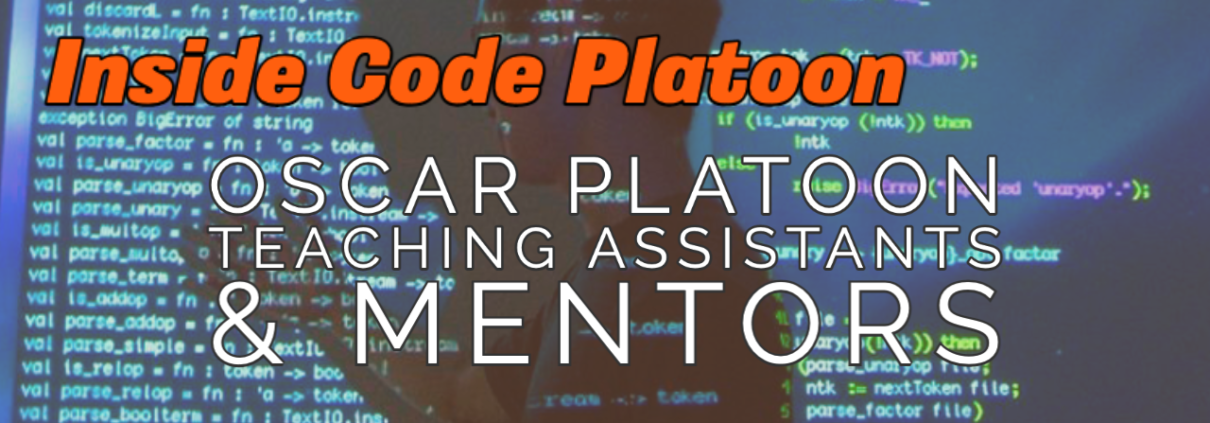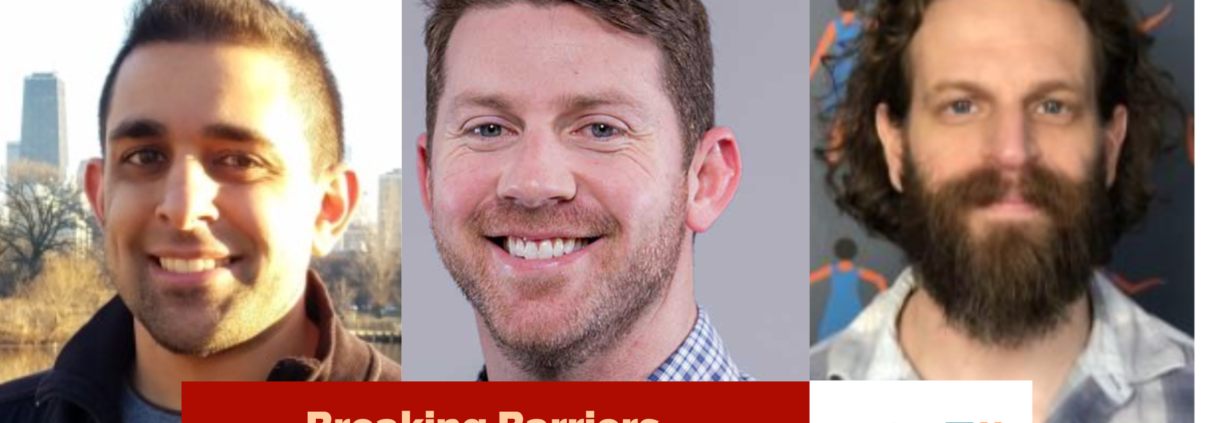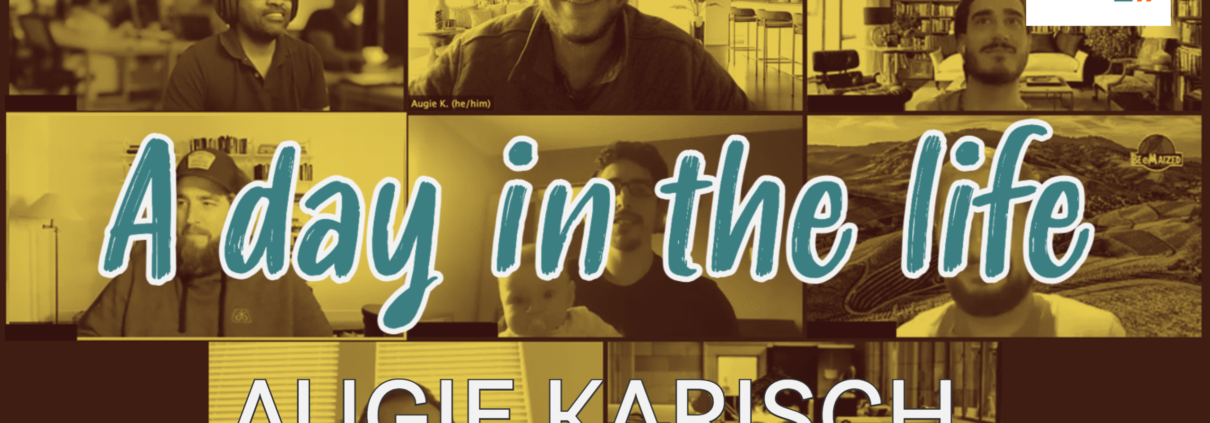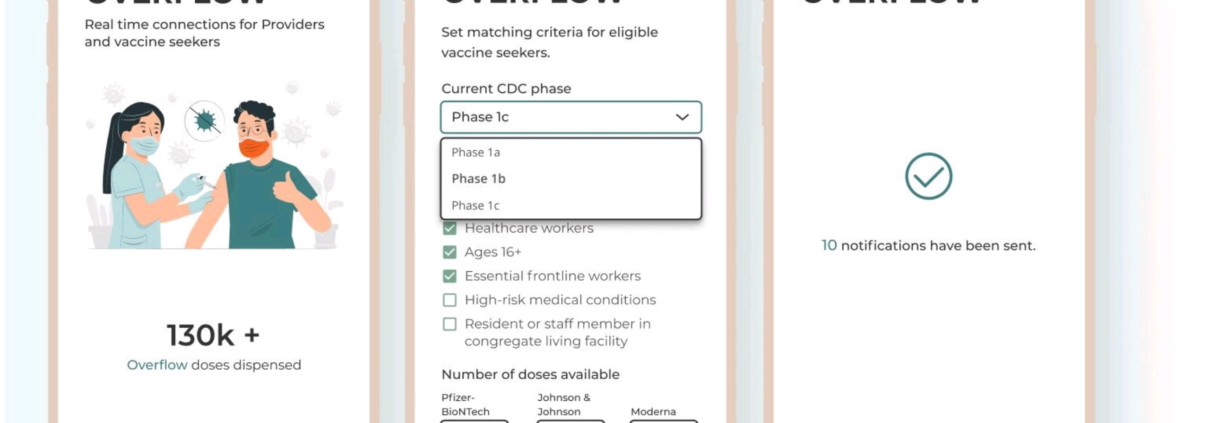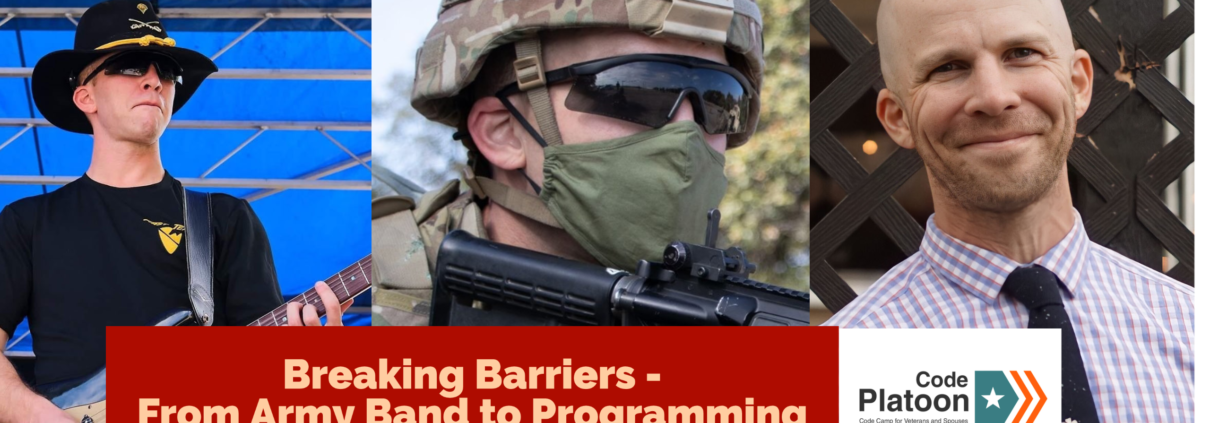Kin + Carta is a digital transformation firm organized around three services: a tech-centric management consultancy, a next-gen software engineering studio, and a digital marketing agency. This year, Kin + Carta joined the Code Platoon family as an Apprenticeship Partner.
Apprenticeship Partners employ the top graduates from each In-Person cohort for a three to six-month paid apprenticeship in a developer-orientated role. As part of the program, Kin + Carta welcomed Mike Platoon graduate Augie Karisch to their team earlier this year.
Recently, the company sat down with Augie to learn more about his experience and shared that in a post on the company’s blog, Inside Kin + Carta. This blog post is presented with permission from Kin + Carta. Thank you to Amy Parker and Kin + Carta for being part of Code Platoon’s mission to help Veterans and military spouses transition to careers in tech.
This year Kin + Carta was proud to sponsor our first Code Platoon cohort.
Code Platoon is an organization that helps veterans and military spouses acquire the skills to be software engineers. They do this by providing technical training and career placement over a 14-week immersive, hands-on, educational process. In addition, the program digs into specialized full-stack development training and “beyond tech” training like team building, mental toughness, diversity & inclusion, personal finance, negotiation & job searching.
Through the sponsorship, we could virtually meet many of the students from Code Platoon’s cohort, share insights into technology consulting, and hire an intern!
We are proud to introduce you to Augie Karisch, the engineer from Code Platoon who’s been a team member within our Digital Products & Services Capability since March. We’ve appreciated the experience and insight he’s brought to our teams, and we have been so impressed by how he dove headfirst into all that Kin + Carta (& our clients!) have to offer.
Hear from Augie as he shares more insight into Code Platoon, Kin + Carta, & the veteran experience. You’ll love what he has to say!
How did you decide to transition into Software Engineering?
In my previous role, I was a manager on a team building a website for use by my company’s customer-facing employees. During this project, I discovered two primary reasons that I wanted to learn more about software engineering.
First, while I enjoyed working on the business side of that project, I often found myself constrained by my limited understanding of the technical work our engineers were doing. I felt like I could be a more effective part of the product team by improving my technical knowledge.
Second, I was inspired by those engineers’ ability to read a user story or hear an idea for a new feature or design element and then make that vision a reality. I wanted to be able to do that!
Besides this specific professional experience, I’ve always loved building things, and I have tons of my own ideas for businesses and products. So I wanted to develop the skills necessary to put those interests and ideas into action.
What was it about Code Platoon’s program that stood out to you?
Code Platoon is designed for military veterans by professional software engineers at top tech companies. That was why I initially looked into the program.
One thing that jumped out to me about Code Platoon was that they work hard to develop strong relationships with companies like Kin + Carta, where graduates have the opportunity to intern. The availability of internships–even though they weren’t guaranteed–made the endeavor feel less risky. The internship program is just one of many forms of career support that Code Platoon provides to its students during and after the program.
I also appreciated that Code Platoon is a nonprofit organization. It felt like our motivations were closely aligned–as a mission-driven organization, they simply wanted to help me get the skills to succeed as a software engineer.
Since its founding several years ago, I had been following Code Platoon, always telling myself that one day I’d apply. It was a tough decision to leave the great job I had at the time. Still, a combination of my desire to learn to code and the availability of a fantastic VA program that sponsors technical education for veterans (VET TEC) pushed me to take the leap. It’s been a great decision so far.
Tell us about the coolest project you’ve worked on as a software engineer thus far.
I worked on a couple of really exciting projects during Code Platoon. One was an audio journaling app that I had been thinking about for a long time, and I finally found myself with the skills necessary to build it. Another group project was where we designed and built a website that would suggest potential travel destinations and let users book flights based on their budget, desired temperature, and other criteria. Again, I was lucky to be on a very talented and collaborative team who made the process fun, along with outstanding Code Platoon guidance and mentorship.
But, I think the coolest project I’ve worked on so far is my current project at Kin + Carta. I am working alongside incredibly talented and supportive teammates to build a brand new customer-facing product for an exciting and impactful client. There is nothing like a real-world project for learning and professional growth, and I feel like I’m making leaps and bounds every day. I’m so grateful for the opportunity to work with and learn from this team.
When deciding where to intern, what stood out the most to you about Kin + Carta?
Kin + Carta was my top choice for an internship for several reasons. First, I wanted the opportunity to work on customer-facing products, and I knew that Kin + Carta leads high-profile projects for its clients, many of which directly impact their customers. Second, in thinking about the first step towards a long-term career in tech, I was especially interested in the consulting model. Third, I saw an opportunity for exposure to a variety of clients, products, and technologies. The breadth of technical and industry exposure available at Kin + Carta sounded exciting to me. Finally, as someone with a diverse background that includes operations leadership, product management, and general strategy work, I was excited to be in a dynamic environment where there were several different business models, client relationships, products, and lines of business all running simultaneously, constantly changing and impacting the firm in different ways. I saw this all happening at Kin + Carta, and it seemed like an exciting and energetic place to grow my career in tech.
I spoke with a handful of people from the firm before I interviewed, and I found them all to be extremely smart, welcoming, encouraging, and happy with their jobs. This seemed like a good indicator of the culture and environment that I was seeking. The same positivity and optimism have proven to be the typical attitude among my coworkers.
Finally, Kin + Carta was growing quickly when I was interviewing, which is another sign of a healthy company with lots of career opportunities. The growth has continued since I’ve been here, and the list of brand-name clients is incredible (and even getting longer). I was fortunate enough to be invited to intern at Kin + Carta, and it’s been a fantastic experience so far.
You’ve completed the Bootcamp & internship programs totally virtually—what’s that been like?
At first, I was disappointed that I wouldn’t be learning in person–I’ve been through a lot of schooling, and this was my first remote experience. But, I felt like Code Platoon did a good job ensuring that we got the same high-quality education that we would have had in person. The instructors, TA’s, and administrators were very hands-on and supportive. They also leverage various tools and services to ensure students can communicate easily with instructors and one another. This allowed us to access and quickly absorb the material. In addition, during the cohort, I met a handful of classmates for an outdoor, socially distanced happy hour. I made close personal connections with several classmates, both in Chicago and elsewhere.
The remote internship has been a similarly new experience for me. It is strange to have worked with my team for several weeks now and never met them in person. I’m pretty sociable, so I like the spontaneity and energy of an in-person workplace. Through this experience, I have learned to appreciate the convenience and flexibility of a home office. Kin + Carta provides the tools we need to stay connected and collaborate digitally. Most importantly, my teammates and the other people I’ve met across the firm are incredibly generous with their time and have been willing to meet for [virtual] coffee or help with technical questions whenever I have asked.
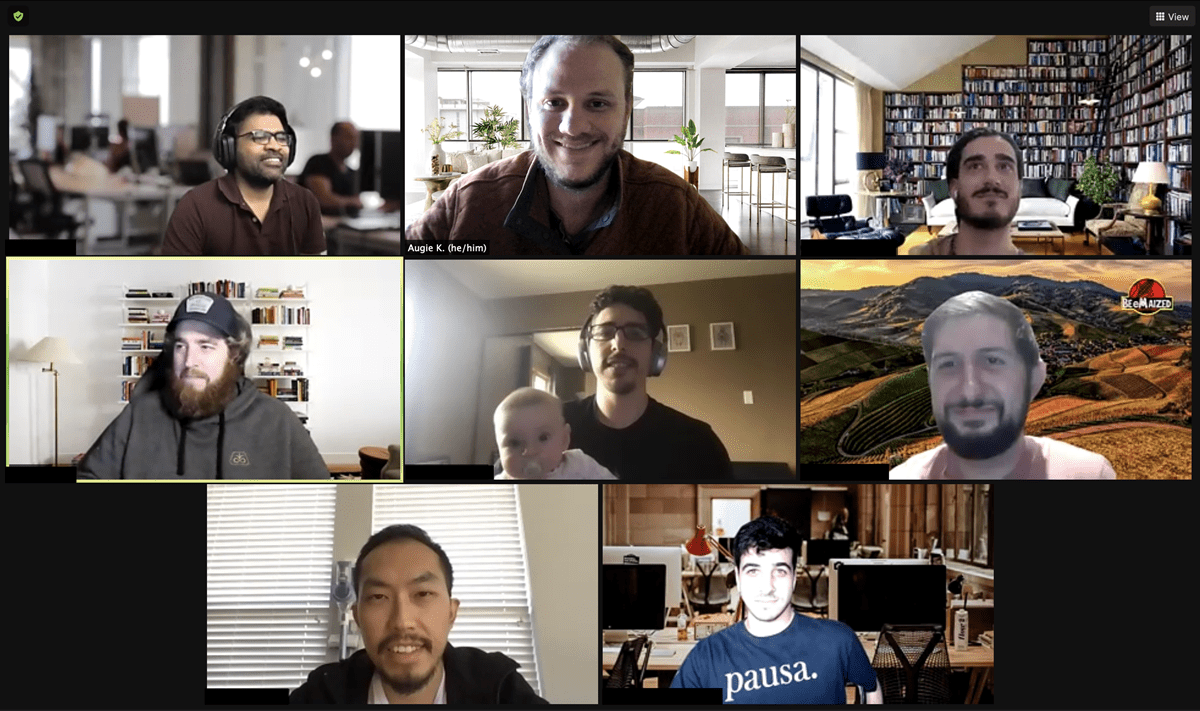
Augie and the team of developers who he’s been working with for the last several weeks. This is one of several tech teams that supports an AgTech client of Kin + Carta.
How has your experience as a veteran translated to working at Kin + Carta?
As an officer in the military, you learn to enter a new environment, get up to speed very quickly, and then support a mission in whatever way you are needed, whether or not you were trained for that exact scenario. That resourcefulness and flexibility have served me well so far at Kin + Carta. I expect it to continue to be valuable as I eventually move to new clients, new teams, and new roles within the firm.
Another aspect of the military that translates well is the experience of working with lots of different kinds of people. One of my favorite parts of the military was that I had coworkers from every corner of the country and even the world, from many different backgrounds. I learned something every day just by being open to new perspectives. The same is true of Kin + Carta (and Code Platoon), where I have teammates in several states and across Latin America. I learned early in the military that great ideas and excellent work can come from anyone. I have also seen that borne out at Kin + Carta, where title and years of experience are secondary to ideas and results.

Augie at the bottom of a dry dock as USS Chung-Hoon completes a maintenance overhaul.
What advice do you have for transitioning service members and veterans thinking about a career in technology?
People don’t always realize that there are many non-technical and semi-technical roles in the tech industry. You don’t just have to be a software engineer (although that is a great choice!), and you don’t have to do the same thing you did in the military. I would encourage transitioning service members to make a list of their personal and professional strengths and take the time to match those skills and interests to jobs and companies by perusing job postings, company websites, LinkedIn profiles, etc. There are jobs in tech for every strength and interest. I am not an engineer or a technician by background–I have a liberal arts degree and an MBA. I just wanted to combine my love for building things with my interest in functional and efficient digital experiences. Tech and coding have been a great way for me to pursue those interests professionally, and you need to find the field(s) that lets you follow your interests.
You should definitely be networking with people in industries and roles that interest you. Create a professional LinkedIn profile and send short, professional direct messages to veterans in jobs and industries that you like. Ask them if they have 10-15 minutes to talk on the phone about their career path and their transition out of the military. Many people will make time for you, and you will learn a lot about their company and the industry they work within, and how to network like a civilian. Many big companies have whole teams dedicated to military and veteran recruiting; follow these recruiters on LinkedIn and keep an eye on their posts. The more familiar you get with different companies and roles, the more you’ll be able to target your search for the perfect opportunity, whether that’s a job, an education, or some other path. You can start by reaching out to me!
I also recommend that you learn as much as possible about your VA benefits. You may be surprised at what they cover, and there are ways to maximize your benefits, like understanding when the VA’s fiscal year starts and how to combine benefits with those from your state or your school. I used a VA program called VET TEC to fund my education at Code Platoon. Many of my classmates were still on active duty and using a program called DoD SkillBridge. Be sure to do some of your own research and networking to ensure you’re aware of the opportunities available and relevant to you.
The transition out of the military can be challenging. The culture shock of reentering the civilian world and the balance between your strong military identity and your new civilian reality takes time to figure out. Here are a few government and nonprofit resources that I have found helpful and that I know others have used as well. Google them, join their webinars, contact them, and see what they have to offer: U.S. Department of Veterans Affairs, Service2School, Code Platoon, Road Home Program, Hiring Our Heroes (Kin + Carta does a HoH fellowship—read more here!), American Corporate Partners, your state and city VA departments (separate from national VA), not-for-profit colleges and universities in your area, and your fellow veterans.


